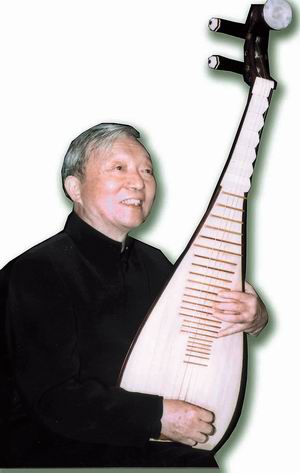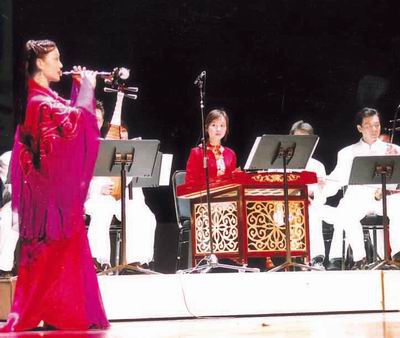
Pipa master Liu Dehai performs at the ¡°The Soul and Charm of
Chinese Music¡± event, one of the only two traditional Chinese music concerts at
this year¡¯s Shanghai International Arts Festival.

Hou Yanqiu (left) performs on the suona at the
concert.
Shanghai Daily news
As the old Chinese saying goes: ``An elder at home is like having a
treasure.'' Old people are more knowledgeable about what it takes when one is
going through different life stages and if they ever manage to shake off their
conservativeness -- a conventional label -- they can be strikingly innovative.
This is illustrated by the story of five veteran traditional Chinese
musicians -- Liu Dehai, 67, Dai Shuhong, 68 and Gong Yi, Li Xiangting and Yan
Shouping, all 64 -- who performed at last week's ``The Soul and Charm of Chinese
Music,'' part of the Sixth Shanghai International Arts Festival. The grand
get-together featured them as an all-star soloist line-up -- a ``Who's Who'' of
expert exponents of traditional Chinese music. Each is reputed to be the best in
China on his instrument and the veteran musicians, playing before a backdrop of
Chinese calligraphy and videos of the countryside of Jiangnan (the region to the
south of the Yangtze River), presented a representative collection of the
masterpieces of traditional Chinese music.
``All these melodies are very
familiar to me. In fact I have grown up with them but it's still a refreshing
experience to hear them performed by these maestros,'' says local poet Zhao Lan,
30. ``I could really feel the spirit of what they wanted to convey. It was
sincere and complex rather than just a playing of the notes from the original
scores.'' But Zhao, along with most others in the audience, did not know when
the curtain went up that there had been no complete rehearsals for the concert
and that most of the veteran soloists had had to squeeze the time from their
busy schedules to play that night at one of the only two Chinese music concerts
on this year's festival program. ``As a Chinese international arts festival,
it's the festival's obligation to provide a platform for more Chinese musicians
to present their artistry but now this embarrassing imbalance is a shame and it
somehow reflects a blind faith in foreign things,'' says an indignant Liu,
unarguably the most influential ``pipa'' (a plucked string instrument similar to
the Western lute) master of the modern era.
A Shanghai native, Liu has
devoted some 50 years to perfecting his ``pipa'' performance skills and in
maintaining the popularity of Chinese music. He is also widely recognized as the
most authoritative interpreter of the ``pipa'' classic, ``Ambuscade from Ten
Sides,'' which he played at the festival concert, giving the piece a remarkable
jazzy style and demonstrating his dazzling plucking skills that would have made
a top rock bassist open his eyes wide. After the signature piece, Liu did a bold
rendition of ``Liuyang River,'' a famous Hunan folk song dedicated to the late
Chairman Mao Zedong and the whole theater applauded Liu's singing and playing.
``Traditional Chinese music is part of a refined grassroots culture. As
professional musicians who are the mainstays of the art form, we must protect
its raw beauty by rediscovering it and going back to its origins,'' Liu says.
In 2000, Liu, a professor at the Chinese Academy of Music in Beijing,
launched the culture-preservation program, ``One.'' It is a project in which Liu
leads conservatory teachers and students in learning and mastering one type of
China's regional music every year. Within the next decade he hopes to build up a
``gene bank'' of Chinese folk music. The idea behind the project proved to be
practical from the first step which involved Chaozhou music from southern
Guangdong Province and at the Fifth Beijing International Music Festival two
years ago, Liu and his team of folk music collectors revived ancient Chaozhou
music in a concert which included all the major regional instruments and folk
works.
``I am doing this job for the sake of our young generation who seem
to have no awareness of the crisis caused by the decline of traditional
culture,'' Liu says -- and he pauses a while to let this sink in. ``They should
not be blamed for it as the problem is bound up in the way they have been
educated. Moral lessons are not enough for young people who are just opening
their eyes to the world -- they should also be taught more of the humanities, to
have a respect for art and music and a desire to explore.'' The Shanghai
``guqin'' (seven stringed zither) master Gong Yi, like the nature of his
instrument, is scholarly and refined even when talking about the hardships
involved in popularizing one of the most ancient of all Chinese instruments.
``Some people argue that ``guqin'' music is too slow to match the pace of
modern society but I think they mistake the `rhythm' of society with that of
artistic development,'' says Gong. ``It's just like when you are driving along
the highway -- play music that is too wild and you can run the risk of having an
accident.'' Gong has seen more and more young people in Shanghai, mainly
white-collar employees and college students, coming to an awareness of the
importance of spiritual refreshment when they ask to become one of his students.
``As musicians, however, we should always remind ourselves not to be pleased
with sudden gains and not to feel sad about being lonely. Preservation and
reform are both part of the development of Chinese music and we must treat it
with a standard of fairness,'' Gong says. Encouraged by the musicians'
``nobility,'' even the concert producer learned to understand the conflict
between art and market forces. According to the producer, Xiao Yu, the concert
ended up with a loss of more than 500,000 yuan (US$60,240) but she still feels
highly rewarded. ``We've already sent out a strong signal by bringing these big
names together -- that the elite generation of Chinese traditional music are
strongly willing to further contribute and that's enough,'' Xiao says.
And
perhaps that's what most local fans of traditional Chinese music expected to
hear at the city's own arts festival.



